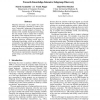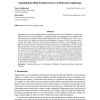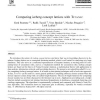9 search results - page 1 / 2 » Non-redundant Subgroup Discovery Using a Closure System |
PKDD
2009
Springer
15 years 8 months ago
2009
Springer
Subgroup discovery is a local pattern discovery task, in which descriptions of subpopulations of a database are evaluated against some quality function. As standard quality functio...
129
click to vote
LWA
2004
15 years 3 months ago
2004
Subgroup discovery can be applied for exploration or descriptive induction in order to discover "interesting" subgroups of the general population, given a certain proper...
162
click to vote
JMLR
2010
14 years 9 months ago
2010
Subgroup discovery aims at finding subsets of a population whose class distribution is significantly different from the overall distribution. A number of multi-class subgroup disc...
103
Voted
IROS
2009
IEEE
15 years 9 months ago
2009
IEEE
— This paper introduces an approach that reduces the size of the state and maximizes the sparsity of the information matrix in exactly sparse delayed-state SLAM. We propose const...
150
click to vote
DKE
2002
15 years 2 months ago
2002
We introduce the notion of iceberg concept lattices and show their use in knowledge discovery in databases. Iceberg lattices are a conceptual clustering method, which is well suit...



